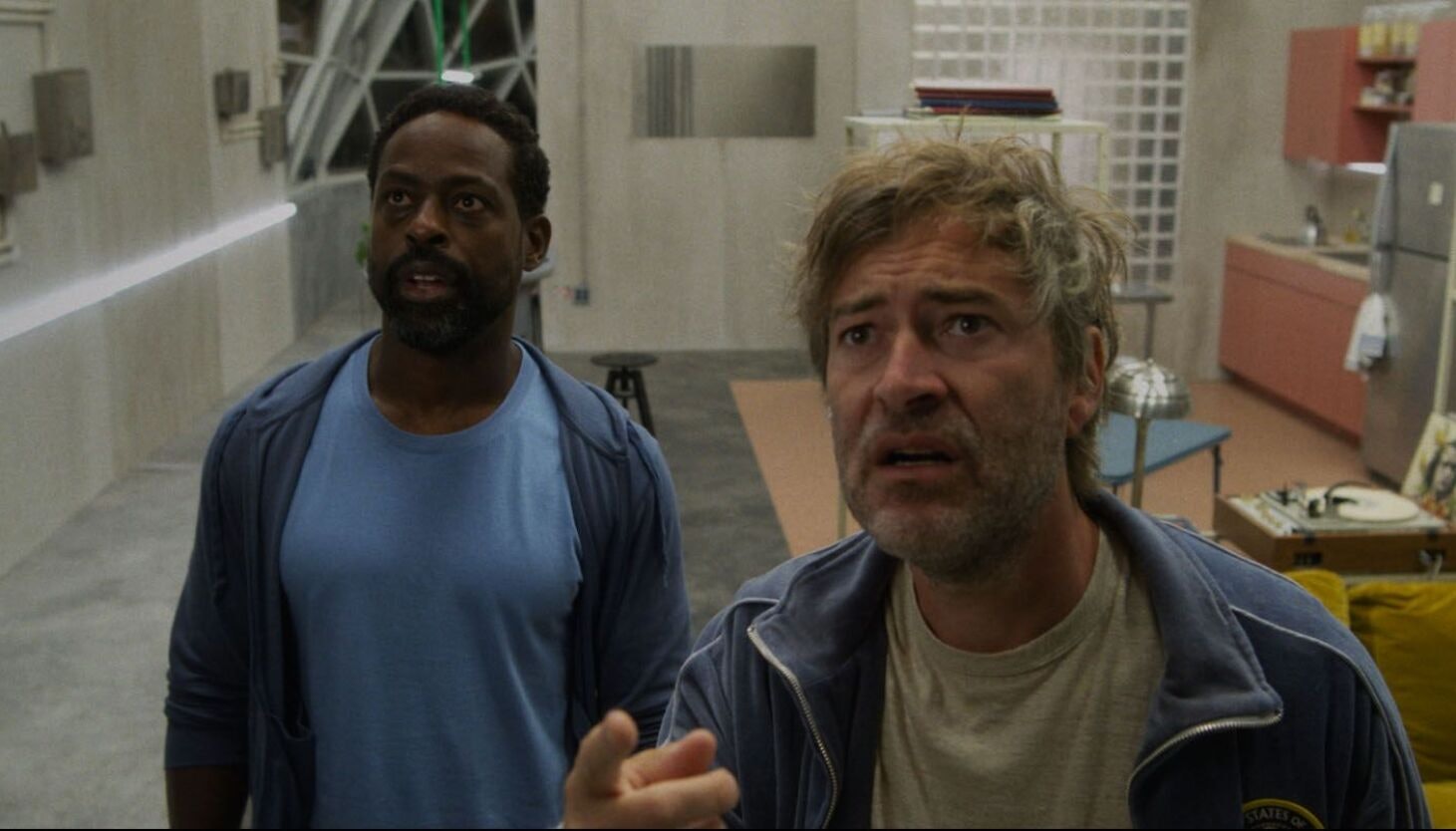
A bright green light in the sky appears to slowly move closer. Down on Earth, Billy and Ray, a pair of childhood friends played by Mark Duplass and Sterling K. Brown, look up and wonder what it means. But like so much in Biosphere, a buzzy new sci-fi comedy with a jaw-dropping ending, the answer to that mystery never comes.
The last two men on Earth, Bill and Ray spend most of Biosphere living out their remaining days in a small, self-sufficient dome. They spend their time jogging, watching Lethal Weapon, and arguing about the Super Mario Bros video game. In another movie, an ominous green light in the sky might become a central plot point, but here, in indie producer Mel Eslyn’s directorial debut, it becomes one of several plot points that never get resolved.
“The green light really was the symbol for hope, and for the unknown and for the beauty in the hope you can find,” Eslyn tells Inverse. “The things you can’t explain.” To the film’s producer and Duplass-collaborator Zackary Drucker, the green light “is a symbol for change. It’s easy to get preoccupied with the actual science and earthly elements of it, but I think, too, it's a kind of spell.”
This symbol for change should, hopefully, prepare the audience for the film’s big twist. Unfortunately, that’s a tall task.
This article contains significant spoilers for the twist and the ending of Biosphere.
Despite generally positive reviews for Biosphere, the indie sci-fi film has already accumulated a few detractors. Phrases such as, “the ending feels like a copout,” have been muttered by critics looking for a larger explanation, and there’s a level of understanding in this response to Biopshere’s non-ending.
Most of the negative reviews deal with the film’s central twist and then the subsequent ending — or lack thereof. Over the course of an indeterminate amount of months that Eslyn wouldn’t clarify, when Billy and Ray’s last female fish dies, they notice a male fish go through evolutionary changes brought on by extreme circumstances: the fish begins to grow female sex organs.
In a few days, Billy begins to do the same, creating an opportunity for the two friends to reproduce with Billy’s now-changed body, an idea that came about after Eslyn read the book Sex in the Sea by Marah J. Hardt. Billy and Ray decide to have sex and the former gets pregnant, though the director said the audience would never get to see Duplass give birth.
“I didn't want to lose certain people,” Eslyn says. “There's definitely an audience that I knew this was going to challenge, with male pregnancy. It was figuring out how far to push it, and the baby was never as far as we were gonna go.”
“I'd love to hear what people want it to be and how they want it to end.”
The ending asks audiences to continually suspend disbelief. The loose threads of Billy’s pregnancy, the green light, and the men’s survival remain tangled. The filmmakers don’t provide any answers to the many questions that they’ve asked.
“I'd love to hear what people want it to be and how they want it to end,” says Eslyn. “But it makes me happy and sometimes that's the best you can do as a filmmaker.”
Duplass and Brown often play these scenes with straightforward acting, focused on the drama of the moment regardless of the underlying current of broad comedy. The characters are less than perfect with their own shifting ideologies, the big twist works due to the two actors’ chemistry — along with Eslyn’s willingness to allow emotion to seep into the absurdism.
“At its core, this film is about interrogating and deconstructing masculinity, which is always presented as neutral in buddy comedies,” says producer Zachary Drucker. “I wish there were more men projecting into a state of imagination of what it would be like to carry a child. His space has been addressed in film in comedic ways, but not in thoughtful ways. And comedy is the great unifier.”

Over and over again, Biosphere toes the line. It wants to reshuffle the audience’s way of thinking. The filmmakers allow room for interpretation, focusing on two characters with shifting views on sex, masculinity, and evolution. The buddy comedy hopes to expand the minds of its viewers, and for cis-men specifically, to imagine what it might be like to carry a child.
“Everything in this movie is about not sticking to the binary and anything,” says Eslyn, “whether it's politics, gender, etc., just the blurring of definitions and the redefinition of self.”
After part of their dome shatters and the men must use the fish tank to re-bandage the walls, they’re out of food and out of options. The question of survival circles the friends-turned-parents-to-be. But then, the credits roll.
“My favorite kind of art is the art that creates space for itself, for us to project ourselves and our experiences and our own definitions,” Eslyn says. That space exists in the film’s final 15 minutes, allowing the audience to focus on themes, not outcomes.
And as for the final, biggest question of all, the one regarding the two men’s survival?
“All ll say that I think that humans survive,” Drucker says, looking to Eslyn to see if she agrees. In response, the director deploys one of Biosphere's lasting phrases, cleverly repurposed from Jurassic Park.
“Life finds a way.”







